Voices: Is it time for distanced cinema screenings, or special events for the immunocompromised?

Good news for cinephiles: Odeon, the UK’s largest cinema chain, is launching a new big screen location, its first of the year. Slated to open in the summer in west London, this is no small achievement given the fierce headwinds the industry has faced. Lockdowns and the focus on streaming services has robbed cinemas of inventory and cut their traditional window of exclusivity. And let us not forget the cost of living crisis.
Odeon nonetheless says it has welcomed 24 million customers and sold 596 tonnes of popcorn – doubtless at a fancy margin – since it reopened. But attendance is still running at just 71 per cent. Which begs a question: Why?
Inventory may play a roll, although Sony’s recent Spiderman movie was a blockbuster deserving of the title, James Bond packed them in and Dr Strange & the Multiverse of Madness has just out-grossed its predecessor. The big films are back. The studios have started to realise the value of a theatrical release, at least for the bigger titles.
Moreover, while Odeon’s new Luxe cinemas are glorious, they they are not cheap to get into and the popcorn will also burn a multiverse-sized hole in your pocket. But the biggest contributor to why everyone isn’t back at the cinemas? My money is on a cinematic long Covid.
You remember Covid? The nasty little virus that turned the world on its head and changed history, long before Vladimir Putin fancied being Ivan the Terrible’s mini-me and sent troops next door with murder and mayhem on their minds?
Most people seem to have put Covid to the back of their minds because of the war and the various other crises that make watching a news bulletin a dark blot at the end of the working day. Masks have fallen out of fashion, even in those places that still ask for them. Sympathy is thin on the ground for what Robert Shrimsley, writing in the FT, referred to as “Covid late-starters”. Does anyone even notice if you post a pic of a double line on your lateral flow on Twitter? Are lateral flows still a thing?
But they are. Even though there is a continuing decline in the (estimated) number of Covid-19 cases, fear of the virus remains very real in a significant part of the population.
The plight of the disabled and the immunosuppressed has been all but forgotten as attention has shifted onto other matters. Yet there are people in those, and other at-risk groups, who continue to stay in, cut off from human contact other than via a screen. Their fears are often quite justified.
Others retain a high degree of Covid caution. Perhaps they’ll go to the shops when it’s quiet. Perhaps they’ll take advantage of the sunny weather at their local park – you are less likely to encounter the virus in an outdoor setting. The greater use of a face masks could do wonders for these people.
I sometimes wonder whether we have forgotten how to care. A look at the behaviour of our leaders would certainly indicate that. Ditto the ranting you will see in the right-wing media, which shamelessly shills for them.
To keep up to speed with all the latest opinions and comment, sign up to our free weekly Voices Dispatches newsletter by clicking here
Humans are social animals. It isn’t healthy for people to be cut off from others. But some people are in that situation. This is a problem we ought to expend some thought on if we could just shut out the blowhards.
Cinemas have, quietly, got rather good at catering for those with needs. Modern ones can be models of accessibility. Many offer autism-friendly screenings, captioning, audio description services. This does them great credit.
Might I suggest an immunosuppressed screening? With masks and social distancing required? The first slot of the day, when they’re clean and fresh and usually pretty empty, wouldn’t be a bad time. It might just be the perfect time. I don’t know if it would work. But surely it’s worth a try.
Other venues could perhaps try the same? With some creativity, it’s surely not impossible.
In a very real sense, the pandemic’s medical shut-ins are its forgotten victims. Their plight is too rarely considered, much less discussed. It isn’t just cinemas, theatres, and other venues that should think about extending a hand to them. It’s on all of us.

